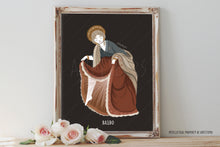

Baubo personifies female fecundity. She is the goddess of the belly laugh, matron of women’s humour. Baubo is a trickster, sacred clown, and a goddess of healing. Baubo’s name may be interpreted as “belly,” “hole,” or “womb.” In her major appearance in classical Greek myth, Baubo is an old nursemaid who exposes her vulva to Demeter. She is the only one able to draw a laugh from the grieving goddess. Baubo sets Demeter on the road to recovery and empowerment.
Baubo’s gesture to Demeter, lifting her skirts to expose her vulva, was not random but had spiritual significance and a name: ana-suromai, literally “to lift one’s skirts.” This gesture turns up again in the rites of Bastet and also in a legend concerning Hathor, where it similarly evokes laughter, reconciliation, and healing. Ana-suromai is a defiant, protective charm against death, sterility, and despair. Significantly, when Baubo flashes her vagina, she is well beyond childbearing age.
Baubo belongs to that group of spirits called the Bona Dea who interact exclusively with women. Men were excluded from their rites and not privy to their mysteries. Unfortunately, whatever information survives about these spirits derives from male sources. Baubo is a guardian spirit of children and babies. Little else is known of her. Her part in the Demeter/Persephone saga is often excised from mythology books, now often considered the province of children.
With the coming of Christianity, Baubo, Goddess of Good Humor, was especially defamed, damned by her votive imagery, now considered obscene rather than sacred or funny. Medieval Demonologists classified her as a Demon.
Images of Baubo protect against the Evil Eye. She is petitioned for fertility and to protect women, children, and babies. She heals through humour. She is a powerful ally for those who are ambivalent about the form and functioning of the female body.
Artist and author Winifred Milius Lubell explores Baubo’s image and myth in her book, The Metamorphosis of Baubo: Myths of Woman’s Sexual Energy.




